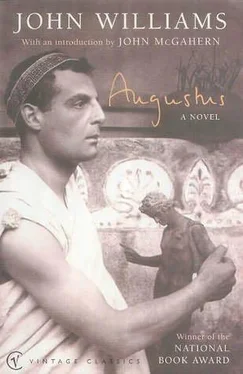John Williams - Augustus
Здесь есть возможность читать онлайн «John Williams - Augustus» весь текст электронной книги совершенно бесплатно (целиком полную версию без сокращений). В некоторых случаях можно слушать аудио, скачать через торрент в формате fb2 и присутствует краткое содержание. Жанр: Историческая проза, на английском языке. Описание произведения, (предисловие) а так же отзывы посетителей доступны на портале библиотеки ЛибКат.
- Название:Augustus
- Автор:
- Жанр:
- Год:неизвестен
- ISBN:нет данных
- Рейтинг книги:3 / 5. Голосов: 1
-
Избранное:Добавить в избранное
- Отзывы:
-
Ваша оценка:
- 60
- 1
- 2
- 3
- 4
- 5
Augustus: краткое содержание, описание и аннотация
Предлагаем к чтению аннотацию, описание, краткое содержание или предисловие (зависит от того, что написал сам автор книги «Augustus»). Если вы не нашли необходимую информацию о книге — напишите в комментариях, мы постараемся отыскать её.
Augustus — читать онлайн бесплатно полную книгу (весь текст) целиком
Ниже представлен текст книги, разбитый по страницам. Система сохранения места последней прочитанной страницы, позволяет с удобством читать онлайн бесплатно книгу «Augustus», без необходимости каждый раз заново искать на чём Вы остановились. Поставьте закладку, и сможете в любой момент перейти на страницу, на которой закончили чтение.
Интервал:
Закладка:
At seven o'clock this morning, the Fool (that is, Marcus Aemilius Lepidus-whom, you will be amused to know, I have had to make your nominal coequal in power under my command) was waiting at my door with a complaint about Marcus Antonius. It seems that one of Antonius's treasurers was collecting taxes from those who, according to an ancient law cited at tedious length by Lepidus, ought to have their taxes collected by Lepidus's own treasurer. Then for another hour, apparently thinking that allusive loquacity is subtlety, he suggested that Antonius was ambitious-an observation that surprised me as much as if I had been informed that the Vestal Virgins were chaste. I thanked him, and we exchanged platitudes upon the nature of loyalty, and he left me (I am sure) to report to Antonius that he perceived in me some excessive suspicion of even my closest friends. At eight o'clock, three senators came in, one after another, each accusing the other of accepting an identical bribe; I understood at once that all were guilty, that they had been unable to perform the service for which they were bribed, and that the briber was ready to make a public issue of the matter, which would necessitate a trial before the assembly-a trial that they wished to avoid, since it might conceivably lead to exile if they were unable to bribe enough of the jury to insure their safety. I judged that they would be successful in their effort to buy off justice, and so I trebled the reported amount of the bribe and fined each of them that amount, and resolved that I would deal similarly with the briber. They were well-pleased, and I have no fear of them; I know that they are corrupt, and they think that I am… And so the morning went.
How long have we been living the Roman lie? Ever since I can remember, certainly; perhaps for many years before. And from what source does that lie suck its energy, so that it grows stronger than the truth? We have seen murder, theft, and pillage in the name of the Republic-and call it the necessary price we pay for freedom. Cicero deplores the depraved Roman morality that worships wealth-and, himself a millionaire many times over, travels with a hundred slaves from one of his villas to another. A consul speaks of peace and tranquillity-and raises armies that will murder the colleague whose power threatens his self-interest. The Senate speaks of freedom-and thrusts upon me powers that I do not want but must accept and use if Rome is to endure. Is there no answer to the lie?
I have conquered the world, and none of it is secure; I have shown liberty to the people, and they flee it as if it were a disease; I despise those whom I can trust, and love those best who would most quickly betray me. And I do not know where we are going, though I lead a nation to its destiny.
Such, my dear nephew, whom I would call my son, are the doubts that beset the man whom they would make a king. I envy you your winter in Apollonia; I am pleased with the reports of your studies; and I am happy that you get along so well with the officers of my legions there. But I do miss our talks in the evenings. I comfort myself with the thought that we shall resume them this summer on our Eastern campaign. We shall march across the country, feed upon the land, and kill whom we must kill. It is the only life for a man. And things shall be as they will be.
IV. Quintus Salvidienus Rufus: Notes for a Journal, at Apollonia (March, 44 B.C.)
Afternoon. The sun is bright, hot; ten or twelve officers and ourselves on a hill, looking down at the maneuvers of the cavalry on the field. Dust rises in billows as the horses gallop and turn; shouts, laughter, curses come up to us from the distance, through the thud of hoofbeats. All of us, except Maecenas, have come up from the field and are resting. I have removed my armor and am lying with my head on it; Maecenas, his tunic unspotted and his hair unruffled, sits with his back against the trunk of a small tree; Agrippa stands beside me, sweat drenching his body, his legs like stone pillars; Octavius beside him, his slender body trembling from its recent exertion-one never realizes how slight he is until he stands near someone like Agrippa-his face pale, hair lank and darkened by sweat, plastered to his forehead; Octavius smiling, pointing to something below us; Agrippa nodding. We all have a sense of well-being; it has not rained for a week, the weather has warmed, we are pleased with our skills and with the skills of the soldiers.
I write these words quickly, not knowing what I shall have occasion to use in my leisure. I must get everything down.
The horsemen below us rest; their horses mill around; Octavius sits beside me, pushes my head playfully off the armor; we laugh at nothing in our feeling for the moment. Agrippa smiles at us and stretches his great arms; the leather of his cuirass creaks in the stillness.
From behind us comes Maecenas's voice-high, thin, a little affected, almost effeminate. "Boys who play at being soldier," he says. "How unutterably boring."
Agrippa-his voice deep, slow, deliberate, with that gravity that conceals so much: "If you had it in your power to remove that ample posterior from whatever convenient resting place it might encounter, you would discover that there are pleasures beyond the luxuries you affect."
Octavius: "Perhaps we could persuade the Parthians to accept him as their general. That would make our task easier this summer."
Maecenas sighs heavily, gets up, and walks over to where we are lying. For one so heavy, he is very light on his feet. He says: "While you have been indulging yourselves in your vulgar displays, I have been projecting a poem that examines the active versus the contemplative life. The wisdom of the one I know; I have been observing the foolishness of the other."
Octavius, gravely: "My uncle once told me to read the poets, to love them, and to use them-but never to trust them."
"Your uncle," says Maecenas, "is a wise man."
More banter. We grow quiet. The field below us is almost empty; the horses have been led away to the stables at the edge of the field. Below the field, from the direction of the city, a horseman, galloping at full speed. We watch him idly. He comes to the field, does not pause there, but crosses it wildly, careening in his saddle. I start to say something, but Octavius has stiffened. There is something in his face. We can see the foam flying from the horse's mouth. Octavius says: "I know that man. He is from my mother's household."
He is almost upon us now; the horse slows; he slides from his saddle, stumbles, staggers toward us with something in his hand. Some of the soldiers around us have noticed; they run toward us with their swords half-drawn, but they see that the man is helpless with exhaustion and moves only by his will. He thrusts something toward Octavius and croaks, "This-this-" It is a letter. Octavius takes it and holds it and does not move for several moments. The messenger collapses, then sits and puts his head between his knees. All we can hear is the hoarse rasp of his breathing. I look at the horse and think absently that it is so broken in its wind that it will die before morning. Octavius has not moved. Everyone is still. Slowly he unrolls the letter; he reads; there is no expression on his face. Still he does not speak. After a long while he raises his head and turns to us. His face is like white marble. He puts the letter in my hand; I do not look at it. He says in a dull, flat voice: "My uncle is dead."
We cannot take in his words; we look at him stupidly. His expression does not change, but he speaks again, and the voice that comes out of him is grating and loud and filled with uncomprehending pain, like the bellow of a bullock whose throat has been cut at a sacrifice: "Julius Caesar is dead."
"No," says Agrippa. "No."
Maecenas's face has tightened; he looks at Octavius like a falcon.
Читать дальшеИнтервал:
Закладка:
Похожие книги на «Augustus»
Представляем Вашему вниманию похожие книги на «Augustus» списком для выбора. Мы отобрали схожую по названию и смыслу литературу в надежде предоставить читателям больше вариантов отыскать новые, интересные, ещё непрочитанные произведения.
Обсуждение, отзывы о книге «Augustus» и просто собственные мнения читателей. Оставьте ваши комментарии, напишите, что Вы думаете о произведении, его смысле или главных героях. Укажите что конкретно понравилось, а что нет, и почему Вы так считаете.











